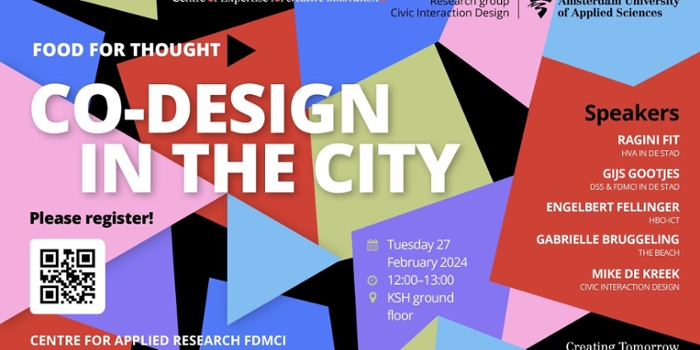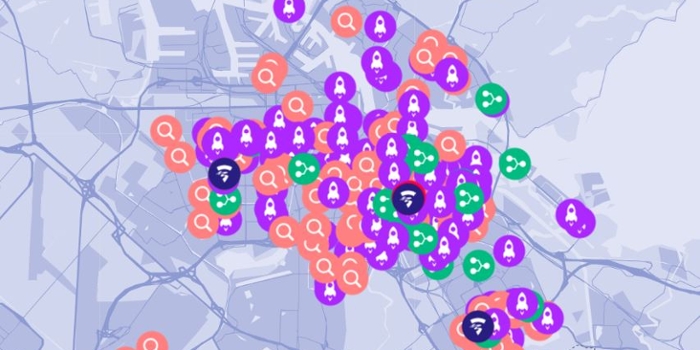Food for Thought Inspiration Session
Co-design in the city
EvenementJoin the monthly live lunch meeting of the Centre for Applied Research FDMCI and CoECI, aimed at researchers, teachers and students. Several speakers update you on current research, new insights and their lessons learned. This time, the Food for Thought is dedicated to Living Labs of 'HvA in the City' and 'FDMCI in the City'. The session will take place in English on the ground floor of the Kohnstammhuis (KSH).

Co-design in the city
Helping to shape the city is something the Amsterdam University of Applied Sciences (AUAS) is working on every day. We do this in Living Labs together with researchers, lecturers, students and many partners and residents in the city.
What meaningful 'co-designing the city' looks like, we will show you during this Food for Thought session using various examples from education and research at the Faculty of Digital Media and Creative Industry.
Discover that the power of co-design lies in bringing together diverse perspectives, leading to innovative and broad-based solutions that better fit different needs.
Programme
Ragini Fit, project manager at 'HvA in de Stad', will discuss why and in what ways the AUAS connects with the city through AUAS Living Labs. She supports her contribution using the map of 'HvA in de Stad'.
Gijs Gootjes, as portfolio holder of 'FDMCI in de Stad', shows through some examples how the Faculty DMCI actively contributes to the AUAS ambition 'Making impact with partners in the City', both inside and outside the faculty.
We then zoom in on two concrete initiatives from FDMCI.

‘HvA in the City’ / Education
Since 2022, Amsterdam University of Applied Sciences (AUAS) offers the minor 'Global Call to Action – Make it Happen' to bachelor students within the Faculty of Digital Media and Creative Industry, attracting international participants from disciplines that include business, management, accounting, sports, urban environment, design, and IT.
To overcome the perceived gap between discussing sustainability and actioning change, students are encouraged to design solutions that help to address grand challenges, including climate change, biodiversity preservation, and implementing circular economy principles.
Examples of products, services, and concepts that students developed during the course include consultancy methods to reduce the digital footprint and digital hoarding of companies, thus saving tons of carbon per client; solutions to eliminate food waste in hospitals; a marketplace for the reuse of building materials for large projects; ideas for the municipality of Amsterdam to increase biodiversity, sustainability, and wellbeing.
During this Food for Thought session Engelbert Fellinger, lecturer and researcher at HBO-ICT, discusses how international students were working with participants in de Dapperbuurt and in which ways their observations inspired the city council to think outside the box.

‘FDMCI in the City’ / Research
Gabrielle Bruggeling, program manager of the SPRONG research project 'Imagination in transitions', and Mike de Kreek, researcher at the research group Civic Interaction Design, provide a contribution on The Beach (Buurtcampus West): from this socio-cultural organisation, in collaboration with professors and students from Universities of Applied Sciences, they investigate what creative methods can mean for the Department for Work, Participation and Income at the municipality of Amsterdam.
Here, they are looking for ways to communicate with job-seeking citizens in a more inclusive way (non-language and non-digital).
reIMAGEning job interview - Imagination in Transitions
Do you ever have the feeling that your CV does not represent everything you are? In this mini-workshop we will experiment with new methods for job interviews in order to look for new ways of communicating. This is an illustration of one of the so called Imagination Workshops (Verbeeldingswerkplaatsen) that play a central role in the SPRONG project Imaginations in Transitions (Verbeelding in Transities).

About the speakers
Ragini Fit is experienced in community management inside and outside the AUAS, communication on applied research and hybrid learning environments in the city.
She is currently working as a project manager at the Amsterdam University of Applied Sciences, specifically for the AUAS ambitions 'Rich learning environments' and 'Impact with partners'. Here she focuses, among other things, on the platforms 'HvA in the City', Neighbourhood Campus, OpenResearch, Publinova, the National Network Research Communication Universities of Applied Sciences and the City Deal 'Kennis Maken'.
She also has a temporary appointment as Community quartermaster at Publinova (SURF). Ragini holds a master's degree (MA) in communication studies with a specialisation in information studies (1999).

Gijs Gootjes is Co-Founder and Strategy Director of Digital Society School at the Amsterdam University of Applied Sciences (AUAS), Faculty of Digital Media & Creative Industries (+10K Students).
He focuses on building public private partnerships from FDMCI in Higher Education and the Amsterdam Innovation Ecosystem.
Gijs has created a rich variety of initiatives where design and technology are being combined to impact societal challenges. He is also portfolio holder of the initiative ‘FDMCI in the City’.

Engelbert Fellinger is a lecturer and researcher at HBO-ICT. He is specialized in professional skills, IT infrastructure, digital sustainability, and the circular economy.
Gabrielle Bruggeling is program manager at the research project from SPRONG called 'Imagination in Transitions' (ViT). From the socio-cultural organisation The Beach and together with lecturers and students from Universities of Applied Sciences, she investigates what creative methods can mean for the Department for Work, Participation and Income at the municipality of Amsterdam.
Gabrielle also works at the Amsterdam School of the Arts (AHK).

Mike de Kreek discovered that learning is primarily a social process when he wrote his thesis on first language acquisition in children (UvA, computer linguistics). The relationship between learning and new media are therefore mainly in the social as far as he is concerned.
After Mike had been working on ICT in education from 1999 at the Department of Educational Research and Development of the AUAS, he shifted to other application areas.
At the practical research centre of the Social and Law Domain, he joined as programme leader Social application of new media in 2006. New media give us new tools to shape our lives individually and collectively. Mike dealt with those new tools in his PhD research entitled 'Collective Empowerment through Local Memory Websites : balancing between group interest and common good'.
He is currently a researcher at the Civic Interaction Design lectureship of the Centre for Applied Research FDMCI. Previously, Mike taught Qualitative Research Design and Techniques in the Master of Social Work (also at the AUAS).

Civic Interaction Design
Want to know more about the Civic Interaction Design research group at the Centre for Applied Research FDMCI? Then take a look at this portal.
HvA in de Stad
Curious to find out more about the 'HvA in the City' platform? Read more on this page.
Centre of Expertise for Creative Innovation
If you are curious what exactly the CoE for Creative Innovation does, you can find more information on their website.
